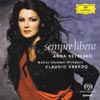Anna Netrebko - Sempre libera
This rising Russian soprano tackles taxing repertory with confidence and artistry
View record and artist detailsRecord and Artist Details
Composer or Director: Vincenzo Bellini, Giuseppe Verdi, Giacomo Puccini, Gaetano Donizetti
Genre:
Vocal
Label: Deutsche Grammophon
Magazine Review Date: 13/2004
Media Format: Super Audio CD
Media Runtime: 69
Mastering:
Stereo
DDD
Catalogue Number: 474 8812GSA

Tracks:
| Composition | Artist Credit |
|---|---|
| (La) traviata, Movement: ~ |
Giuseppe Verdi, Composer
Anna Netrebko, Soprano Claudio Abbado, Conductor Giuseppe Verdi, Composer Mahler Chamber Orchestra Saimir Pirgu, Tenor |
| (La) Sonnambula, Movement: ~ |
Vincenzo Bellini, Composer
Anna Netrebko, Soprano Claudio Abbado, Conductor Mahler Chamber Orchestra Milan Verdi Symphony Chorus Saimir Pirgu, Tenor Vincenzo Bellini, Composer |
| (I) Puritani, Movement: ~ |
Vincenzo Bellini, Composer
Andrea Concetti, Bass Anna Netrebko, Soprano Claudio Abbado, Conductor Mahler Chamber Orchestra Nicola Ulivieri, Bass-baritone Vincenzo Bellini, Composer |
| Lucia di Lammermoor, '(The) Bride of Lammermoor', Movement: ~ |
Gaetano Donizetti, Composer
Andrea Concetti, Bass Anna Netrebko, Soprano Claudio Abbado, Conductor Gaetano Donizetti, Composer Mahler Chamber Orchestra Milan Verdi Symphony Chorus Nicola Ulivieri, Bass-baritone |
| Otello, Movement: ~ |
Giuseppe Verdi, Composer
Anna Netrebko, Soprano Claudio Abbado, Conductor Giuseppe Verdi, Composer Mahler Chamber Orchestra Sara Mingardo, Mezzo soprano |
| Otello, Movement: Ave Maria |
Giuseppe Verdi, Composer
Anna Netrebko, Soprano Claudio Abbado, Conductor Giuseppe Verdi, Composer Mahler Chamber Orchestra Sara Mingardo, Mezzo soprano |
| Gianni Schicchi, Movement: O mio babbino caro |
Giacomo Puccini, Composer
Anna Netrebko, Soprano Claudio Abbado, Conductor Giacomo Puccini, Composer Mahler Chamber Orchestra |
Author: Alan Blyth
In this ambitious programme, Anna Netrebko saves her very best for the last – and the best – music. Her account of Desdemona’s Act 3 scena has just about everything one could want – lovely tone, keen line, expressive, finely honed phrasing and a deep involvement with the role that she doesn’t always evince elsewhere.
Particularly affecting and fitting here is her movement from note to note and her subtle use of vibrato, and the inward feeling she brings to the ‘Ave Maria’. Netrebko says in the booklet that she learnt the essentials of bel canto singing from Renata Scotto, so reference to that famed Lucia and Violetta is not out of order. She has listened carefully to her mentor, but what she misses are the ‘larmes dans la voix’ that so informed Scotto’s portrayals. Poor Lucy’s Mad Scene, sung with not a trace of the technical problems that sometimes affected Scotto, does not have the emotional overtones in Scotto’s reading, nor has Amina’s ‘Ah, non credea mirarti’ quite the requisite poignancy, though it is there in embryo. The now common failure to make use of consonants is partly responsible. Similarly, in the recitatives, a little less voice and a little more word-painting would be welcome.
In Violetta’s scena, Netrebko’s gift for shading the tone is slightly vitiated by a lack of intense or personal responses to individual phrases. But with Elvira’s ‘Qui la voce’, that eloquence does appear, and the coloratura in ‘Vien diletto’ is dispatched with bravura.
In any case, all but the most fastidious will find the interpretations of this ever-improving voice and talent hard to resist and – in spite of some of my strictures – the beauty, and often the pathos in the singing is its own advocate. As an encore she gives a charming account of Lauretta’s always-popular appeal to her father. Here as throughout she is greatly helped by Abbado’s experience and understanding, and the sympathetic playing of the Mahler Chamber Orchestra. The recording and supporting singers are more than adequate.
Particularly affecting and fitting here is her movement from note to note and her subtle use of vibrato, and the inward feeling she brings to the ‘Ave Maria’. Netrebko says in the booklet that she learnt the essentials of bel canto singing from Renata Scotto, so reference to that famed Lucia and Violetta is not out of order. She has listened carefully to her mentor, but what she misses are the ‘larmes dans la voix’ that so informed Scotto’s portrayals. Poor Lucy’s Mad Scene, sung with not a trace of the technical problems that sometimes affected Scotto, does not have the emotional overtones in Scotto’s reading, nor has Amina’s ‘Ah, non credea mirarti’ quite the requisite poignancy, though it is there in embryo. The now common failure to make use of consonants is partly responsible. Similarly, in the recitatives, a little less voice and a little more word-painting would be welcome.
In Violetta’s scena, Netrebko’s gift for shading the tone is slightly vitiated by a lack of intense or personal responses to individual phrases. But with Elvira’s ‘Qui la voce’, that eloquence does appear, and the coloratura in ‘Vien diletto’ is dispatched with bravura.
In any case, all but the most fastidious will find the interpretations of this ever-improving voice and talent hard to resist and – in spite of some of my strictures – the beauty, and often the pathos in the singing is its own advocate. As an encore she gives a charming account of Lauretta’s always-popular appeal to her father. Here as throughout she is greatly helped by Abbado’s experience and understanding, and the sympathetic playing of the Mahler Chamber Orchestra. The recording and supporting singers are more than adequate.
Discover the world's largest classical music catalogue with Presto Music.

Gramophone Digital Club
- Digital Edition
- Digital Archive
- Reviews Database
- Full website access
From £8.75 / month
Subscribe
Gramophone Full Club
- Print Edition
- Digital Edition
- Digital Archive
- Reviews Database
- Full website access
From £11.00 / month
Subscribe
If you are a library, university or other organisation that would be interested in an institutional subscription to Gramophone please click here for further information.




